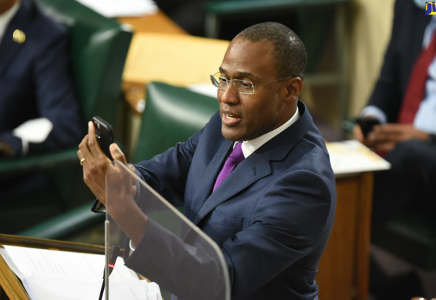Jamaicans reject IMF’s digital currency mandate
The Jamaican population’s general rejection of digital currency is not one of the legacies outgoing finance minister Dr. Nigel Clarke wanted to leave behind when he conducted his first cashless transaction more than two years ago to pay a local barber for a hair cut, in support of the International Monetary Fund’s (IMF) intense push to replace cash. Having failed to fully activate the cashless mandate in Jamaica, the global financial agency’s next deputy managing director must now face the daunting task to convince many more than his barber to accept digital money.
Dr. Clarke, who will assume the second highest position in the IMF on October 31, had announced during his opening of the 2022-2023 budget debate that he had made his first digital currency transaction using digital wallet, Lynk. He had used the app to pay his barber Paul using Jam-Dex. Jam-Dex is the name given to the central bank digital currency (CBDC) designed to be a part of Jamaica’s digital payments system.
“Paul came to my house yesterday to give me a haircut prior to this presentation. When he was finished, I realised that I didn’t have the cash to pay. …Paul is here today, and I am going to log into my Lynk account to pay Paul the $500 I owe him in Central Bank Digital Currency or Jam-Dex …done! That is the first public Jam-Dex transaction ever done in Jamaica,” Clarke stated.
Dr Clarke had announced at the time that the Jamaican government was offering Jam-Dex credit of $2,500 to the first 100,000 Jam-Dex electronic wallets opened effective April 1. This was an incentive for the general public to register as part of the national roll-out.
Lynk was promoted as a multi-currency wallet that would enable users to conduct transactions in Jamaican dollar and Jam-Dex. Lynk was expected to play a critical role in Jamaica’s transition to a fully digital society. Vernon James, then chief executive officer of Lynk, spoke glowingly about the possibilities. Lynk was launched by TFOB (2021) Limited, a subsidiary of National Commercial Bank (NCB) Financial Group Limited. The bank was hoping at least 400,000 would have signed up by the end of 2023. According to media reports, James stepped down in the aftermath of a staff cut at Lynk in September 2023.
Dr. Clarke noted that with the launch of Jam-Dex, efforts must be channelled into ensuring that adequate physical infrastructure is in place to promote the ease of doing business. Speaking during the media launch of the Lynk Automated Banking Machine (ABM) Cash in and Cash Out feature in October 2022, Dr. Clarke assured that the new Lynk feature would play a critical role in Jamaica’s transition to a fully digital society.
“As we push Lynk and CBDC, especially the feature enabling cash in and cash out with ABMs, we have to ensure that [there are] ABMs all over. We can have the conversation, and there are ways in which the Government can play a role. But the idea is that we make financial services available throughout the length and breadth of Jamaica,” he said.
In opening the 2023/24 Budget Debate in the House of Representatives on March 7, Dr Clarke again made a push for increase take up of digital currency, with the introduction of two new incentive programmes. The first one targeted small merchants who operated in industries such as restaurants, gas stations, and personal-care services. There was also the Wallet Holder – Individuals Loyalty Programme, where users of JAM-DEX were to receive loyalty points that could be redeemed for select purposes, including receiving cash back.
Dr. Clarke said effective April 1, 2023, consumers with JAM-DEX wallets, existing and new, would receive two per cent on total purchases for goods and services in JAM-DEX, up to a maximum spend of $5,000. The loyalty funds earned were to be applied to the user’s wallet at the end of each month.
Despite efforts to woo Jamaicans to go cashless with attractive incentives, the take up of digital currency has been slow. While there are about 260,000 wallet-holders now, many of them are not using the facility as was anticipated because they want their existing point-of-sale [POS] machines that accept credit and debit cards to also handle Jam-Dex. The challenge however is that the existing POST machines would need to be modified for this to happen. According to media reports, the Bank of Jamaica intends to get a tech provider to carry out the modifications. The banks and the BOJ would have to fund the initiative. Once this is done, the mass campaign for Jam-Dex is expected to intensify.
Managing director of the IMF, Kristalina Georgieva, anounced last year that the Central bank digital currencies have the potential to replace cash, but adoption could take time.
“CBDCs can replace cash which is costly to distribute in island economies,” she said during the Singapore FinTech Festival last year November. “They can offer resilience in more advanced economies. And they can improve financial inclusion where few hold bank accounts,” she said.
The IMF said that more than 100 countries are exploring CBDCs – or approximately 60% of countries in the world.
“The level of global interest in CBDCs is unprecedented. Several central banks have already launched pilots or even issued a CBDC,” the IMF said in a September report.
Georgieva had proposed that Dr. Clarke be appointed to the position of Deputy Managing Director of the IMF. The move has been lauded as a historic achievement for the Caribbean as Dr. Clarke is the first citizen in the region to be elevated to such a high position in the 80-year-old United Nations body which plays a crucial role in the world’s financial affairs. He is to replace Antoinette Sayeh, who’ll step down from the role on September 12.


